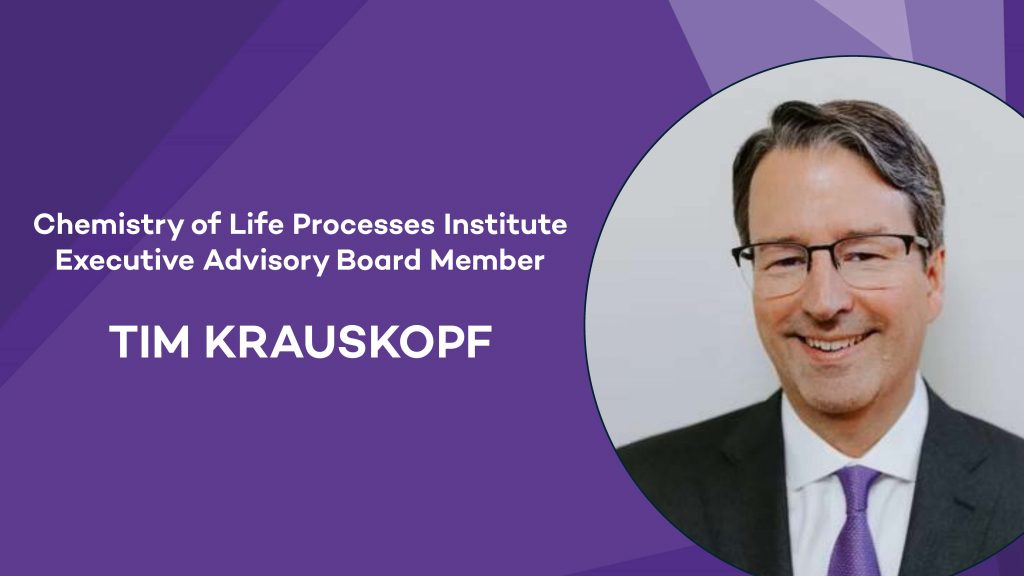
What do you do after launching the first public Internet software company in your early thirties? If you’re Tim Krauskopf, the answer is: keep building, learning, and innovating.
A two-time Northwestern alumnus and member of the Chemistry of Life Processes Institute (CLP) Executive Advisory Board, Krauskopf has followed an unconventional but deliberate path—blending liberal arts, science, technology, entrepreneurship, and even trucking—to become a driving force in innovation.
“I think it was probably my father who pushed me toward a liberal arts education,” says Krauskopf, whose parents were both professors at the University of Missouri. “I knew the basics were going to be more important than a single specialty.”
At Northwestern, Krauskopf enrolled in the Integrated Science Program (ISP), diving deep into chemistry, biochemistry, physics, biology, and mathematics. His real breakthrough, however, came from his fascination with computers. Working at Northwestern’s computing center, he helped students navigate FORTRAN programming on the shared mainframe. By senior year, he was teaching WordStar word processing in the university’s first PC lab.
“The personal computer, the Apple II and IBM PC, became the foundation of my computer experience,” he says.
After earning his BA in just three years, Krauskopf headed to the University of Illinois at Urbana-Champaign for a PhD in computer science. There, he pivoted from research to the newly founded National Center for Supercomputing Applications (NCSA), opting for a more flexible master’s degree, which was based on a PC software project called NCSA Telnet, the first widely distributed free network software from NCSA.
At NCSA, Krauskopf built software to visualize research data from disciplines as diverse as weather simulations and astrophysics. “There was zero hesitation to dive in as a research assistant there,” he recalls. “You’re working with the fastest computer in the world, hanging out with scientists, and building tools on personal computers to support their research. It was ISP in another domain.”
When a colleague suggested turning their work into a business, Krauskopf jumped at the chance. Together, they launched Spyglass, a startup that commercialized NCSA software, initially included scientific visualization programs for the Macintosh. Krauskopf left his university job, worked without a salary for a year, and never looked back.
“Jump in and get it done,” he says. “It was a risk, but we knew we had something valuable, and I was getting an experience like no other.”
Spyglass thrived. In 1993, when NCSA developed Mosaic—the first widely used web browser—Spyglass was tapped to commercialize it. Though rival Netscape competed for attention, Spyglass licensed its browser to Microsoft, which became the foundation for Internet Explorer. The deal generated millions in royalties for the university and helped Krauskopf fund his next phase.
He gave back generously to Northwestern. “Northwestern was really where my life changed,” he says.
At 34, seeking fresh challenges for career opportunities as a startup CEO, Krauskopf enrolled in the Executive Education program at Northwestern’s Kellogg School of Management. He later completed his MBA and served as head of IT at the Field Museum before joining Motorola as VP of the Internet Software & Content Group.
Then, he took an unexpected turn.
“I always had this mechanical, engineering bent from growing up on a farm,” he says. “I could have sailed around the world, but I wanted to learn how to drive a semi.”
Krauskopf wasn’t just looking for adventure. He wanted to understand the trucking business from the ground up. After 160 hours of instruction and a commercial license, he started driving a 48-foot trailer around Chicago and on routes to Indianapolis. He says it is his favorite form of learning a business like trucking—direct involvement.
In 2002, he bought his first Freightliner and launched Round Lake Freight, an interstate trucking company. Within three years, it grew to 15 trucks, 35 trailers, and 16 employees before he sold it to Gemini Traffic Sales. Since then, he’s been advising, launching, and leading companies across multiple industries.
When invited to join CLP’s Executive Advisory Board, Krauskopf didn’t hesitate.
“The idea that more scientific breakthroughs can happen through interdisciplinary collaboration, including medicine, and that it should be made directly useful? That was music to my ISP-trained ears,” he says. “This is about helping Northwestern and CLP pursue real cures for Alzheimer’s and cancer. That’s the scale we need to be thinking on.”
Krauskopf also reflects on the broader meaning of academia and its role in society.
“One of the key things about being human is that we build and sustain institutions that store and grow knowledge, which is true for both businesses and education,” he says. “Northwestern appreciates what it is and why it should still be here 200 years from now—even though the world will change in unimaginable ways.”
From PCs to semis to science, Krauskopf has followed a path fueled by curiosity, creativity, and a commitment to building what’s next.
by Lisa La Vallee

